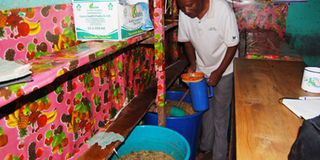Prime
Meet Kabale’s chief enturire brewer

Badiru sieves the drink from containers for his clients, containers he uses to measure the Photos by Henry Lubega.
What you need to know:
SIPPING OF GOODNESS. You can equate enturire to ajono or tonto as it is made from sorghum and other raw materials. Henry Lubega met Badiru Biryomumaisho, the chief brewer of the enturire whose name in Kabale Town is synonymous with the drink
Motorcycles compete with bicycles for parking space. Men and women, youth and elderly compete for sitting space on hard benches facing each other. Some holding metallic mugs, others bowls with pink straws which they keep passing on from one to another. Welcome to North division Kabale Municipality, Badiru Biryomumaisho’s place of abode and home to Obushera Bwe Nturire.
He is a household name when it comes to making enturire a traditional drink in Kabale or Kigezi region. The name Badiru is synonymous with enturire not only in Kabale but also as far as Kampala more than 400km away from his Kyetobokyeire Cell home where he plies his trade.
More than 15 years ago, he resigned his job as a fuel station manager in Kabale town to start making enturire, and he has never looked back or regretted his decision.
The fermented sorghum, water and honey mixture is a traditional social, class, and gender connector in Kigezi, spanning a number of districts in southwest Uganda.
Shrewd businessman
When Badiru left his full-time job as a manager to become his own boss, the motivation was to have a daily income other than wait for the monthly salary.
“I wanted something that would give me a daily income not waiting for end of month pay day to earn,” he says.
With a broad smile, Badiru explains how for the past 15 years enturire has liberated him from financial slavery.
“I have been able to educate my children at up to university as private students through making this,” pointing to the bucket of enturire.
“Had I stayed at my former job as a fuel station manager I would not have managed to educate them and do other personal developments,” he boasts. He attributes his strict book keeping discipline and direct customer care as the key to his success.
“I balance my books on a daily basis looking into the daily income and expenditure. At the end of the month I pay myself, and I pay rent to myself because if I had not built the premises where I work from I would still have to pay rent. That way I’m able to know whether the investment is worthwhile or not.”
Challenges
Just like any business, making and selling enturire has it challenges that Badiru has to deal with on a daily basis. “Raw materials like honey and sorghum are seasonal. Sometimes we get honey from as far as DR Congo, Tanzania and sometimes I have to buy it from Lira when the local supplies run dry,” he says.
He is however quick to add that honey from different parts affect the final product. “The enturire taste is affected by the honey used. With many years’ of experience up my sleeve, I can tell which part of the country or the region the honey used in making the enturire came from.
Currently, sorghum price has shot from Shs 900 a kilogramme to Shs 2000 a kilogramme. But the customers expect to take their favourite drink at the same price despite the vagaries of raw material costs.”
The future
Despite the challenges, Badiru does not see himself switching to another trade. “I’m happy with what I am doing at the moment, not only because I can comfortably provide for my family, I have also been able to create employment for some people along the production line. I have six full time employees and I have other people whom I employ indirectly.”
After 15 years in the trade, Badiru hopes to grow bigger and transform from hand processing to mechanised production of enturire.
“My dream is to have a bigger plant where I can have machines to produce huge quantities and pack it for sale in supermarkets and other places, beyond Kabale. Currently, I supply to people in Kampala on order. I want to go beyond packing the enturire in jerrycans.”
The making of enturire

The brown thick drink is made from sorghum. Dried sorghum is mixed with ash for it to turn from the brown to black. The sorghum is mixed with ash for up to 12 hours for it to change colour.
The sorghum is soaked in water for another 12 hours. Thereafter, it is kept in a dark place for up to four, and minimum of three days for it to ferment. “After three or four days I put the sorghum out to dry before taking it to the grinding mill to make flour,” Badiru explains.
With the flour ready, water is boiled a day earlier and left boiling.
“I have to boil the water for it to be free of diseases or else my customers will fall sick.” The sorghum flour is mixed with the cold water to make thick porridge-like mixture called obushera obutoko. This mixture is kept in big containers such as a barrel depending on the amount you have prepared. This stays for up to four days.
“After the third or fourth day, another mixture of sorghum flour of small quantity is made with warm water mixed with honey to make ekyanga. This is then mixed with the obushera obutoko,” Badiru explains.
He adds that a day after the ekyanga has been mixed with the obushera obutoko it becomes enturire. “At this time it is very sweet because of the honey, by the end of the day its taste changes and the longer it stays, the longer it ferments and becomes potent.”
Badiru, says enturire differs depending on the number of days it has spent being fermented, and that different people have different tastes. “I stock it at different stages depending on people’s taste from the very sweet which is less potent to the one that is four days old and more potent; it depends on one’s taste .”
What patrons say
His name [Badiru] is synonymous with this enturire, enjoyed by both young and old. The bar doubles as the brewing place in Kijuguta has its patrons from sunrise to the time the last patron leaves.
One elderly man who preferred not to disclose his name praises Badiru and his product. “This has been my place of choice for the past 10 or so years. I cannot get the same quality anywhere else. He has kept the quality good despite the changing times.”
Toto, another patron who is a boda boda cyclist rides all the way from kabale town to Badiru’s place to cool off on a bowl of enturire. “After a long day’s work there is no better way to unwind than sip of Badiru’s drink. It is top quality and I cannot do without it,” says Toto.




